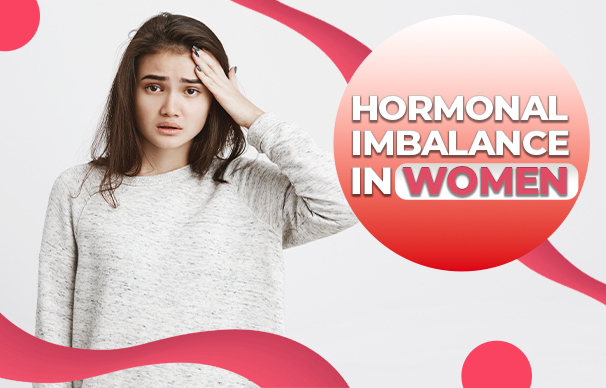Hormonal imbalance is a common yet often misunderstood condition that can have significant implications for women’s health and well-being. Understanding the causes, symptoms, and solutions for hormonal imbalance is crucial for empowering women to take control of their health and achieve hormonal harmony.
Menstrual Irregularities
Hormonal imbalances in women can lead to menstrual irregularities, such as missed periods, irregular cycles, or heavy or prolonged bleeding. These disruptions in the menstrual cycle may indicate imbalances in estrogen, progesterone, or other hormones that regulate menstruation.
Polycystic Ovary Syndrome (PCOS)
PCOS is a common hormonal disorder in women characterized by irregular periods, excess androgen levels, and cysts on the ovaries. Hormonal imbalances, particularly elevated levels of insulin and testosterone, contribute to the symptoms of PCOS, which may include acne, hirsutism, weight gain, and infertility.
Thyroid Dysfunction
Thyroid disorders, such as hypothyroidism or hyperthyroidism, can disrupt hormone levels and affect various bodily functions. Hypothyroidism, characterized by low thyroid hormone levels, can lead to symptoms like fatigue, weight gain, and irregular periods, while hyperthyroidism, marked by excessive thyroid hormone production, can cause symptoms such as weight loss, anxiety, and menstrual irregularities.
Menopause Transition
The menopause transition, also known as perimenopause, involves hormonal fluctuations as a woman’s body prepares to cease menstruation and enter menopause. Hormonal imbalances during this time can lead to symptoms such as hot flashes, mood swings, and irregular periods as estrogen and progesterone levels decline.
Estrogen Dominance
Estrogen dominance occurs when there is an imbalance between estrogen and progesterone levels, with estrogen levels being relatively higher. This hormonal imbalance can lead to symptoms such as breast tenderness, weight gain, mood swings, and heavy or irregular periods.
Adrenal Fatigue
Adrenal fatigue, also known as adrenal insufficiency, occurs when the adrenal glands do not produce enough hormones, particularly cortisol, due to chronic stress or other factors. Hormonal imbalances associated with adrenal fatigue can lead to symptoms such as fatigue, weight gain, low libido, and menstrual irregularities.
Stress Hormones
Chronic stress can disrupt the balance of hormones in the body, particularly cortisol, the primary stress hormone produced by the adrenal glands. Elevated cortisol levels can lead to hormonal imbalances that affect menstrual regularity, fertility, and overall reproductive health.
Insulin Resistance
Insulin resistance is a condition in which cells become less responsive to insulin, leading to high blood sugar levels and increased insulin production. Hormonal imbalances associated with insulin resistance can contribute to symptoms such as weight gain, irregular periods, and difficulty conceiving.
Birth Control Pills
Hormonal contraceptives, such as birth control pills, contain synthetic hormones that can alter natural hormone levels in women. While birth control pills are effective in preventing pregnancy, they can also cause hormonal imbalances that lead to side effects such as irregular bleeding, mood changes, and changes in libido.
Endocrine Disorders
Endocrine disorders, such as Cushing’s syndrome or Addison’s disease, involve dysfunction of the endocrine system and can disrupt hormone levels in the body. Hormonal imbalances associated with endocrine disorders can lead to symptoms such as fatigue, weight changes, and menstrual irregularities.
Diet and Nutrition
Poor diet and nutritional deficiencies can contribute to hormonal imbalances in women. Nutrients such as vitamins, minerals, and fatty acids play crucial roles in hormone production and regulation. Imbalances in these nutrients can disrupt hormone levels and lead to symptoms such as fatigue, mood swings, and irregular periods.
Environmental Toxins
Exposure to environmental toxins, such as endocrine-disrupting chemicals found in plastics, pesticides, and personal care products, can interfere with hormone function and lead to imbalances in women. These toxins can disrupt estrogen, progesterone, and thyroid hormone levels, contributing to symptoms such as menstrual irregularities, weight gain, and reproductive issues.
Genetic Factors
Genetic factors can predispose women to hormonal imbalances and endocrine disorders. Variations in genes related to hormone receptors, hormone production, or hormone metabolism can influence hormone levels and contribute to symptoms such as irregular periods, infertility, and thyroid dysfunction.
Physical Activity
Regular physical activity plays a crucial role in hormone regulation and overall health in women. Both excessive exercise and sedentary behaviour can disrupt hormone levels and lead to imbalances. Hormonal imbalances associated with physical activity may contribute to irregular periods, amenorrhea, and changes in reproductive function.
Age-related Changes
Hormonal imbalances in women are often influenced by age-related changes, such as puberty, pregnancy, and menopause. These life stages involve significant fluctuations in hormone levels as the body matures, undergoes reproductive changes, and transitions into different phases of life. Hormonal imbalances associated with age-related changes can lead to various symptoms and health issues, requiring appropriate management and support.
Conclusion
In conclusion, hormonal imbalance is a complex and multifaceted issue that can affect women of all ages. By understanding the causes, symptoms, and treatment options for hormonal imbalances, women can empower themselves to make informed decisions about their health and well-being. Embrace hormonal harmony and prioritize your health and vitality today.


